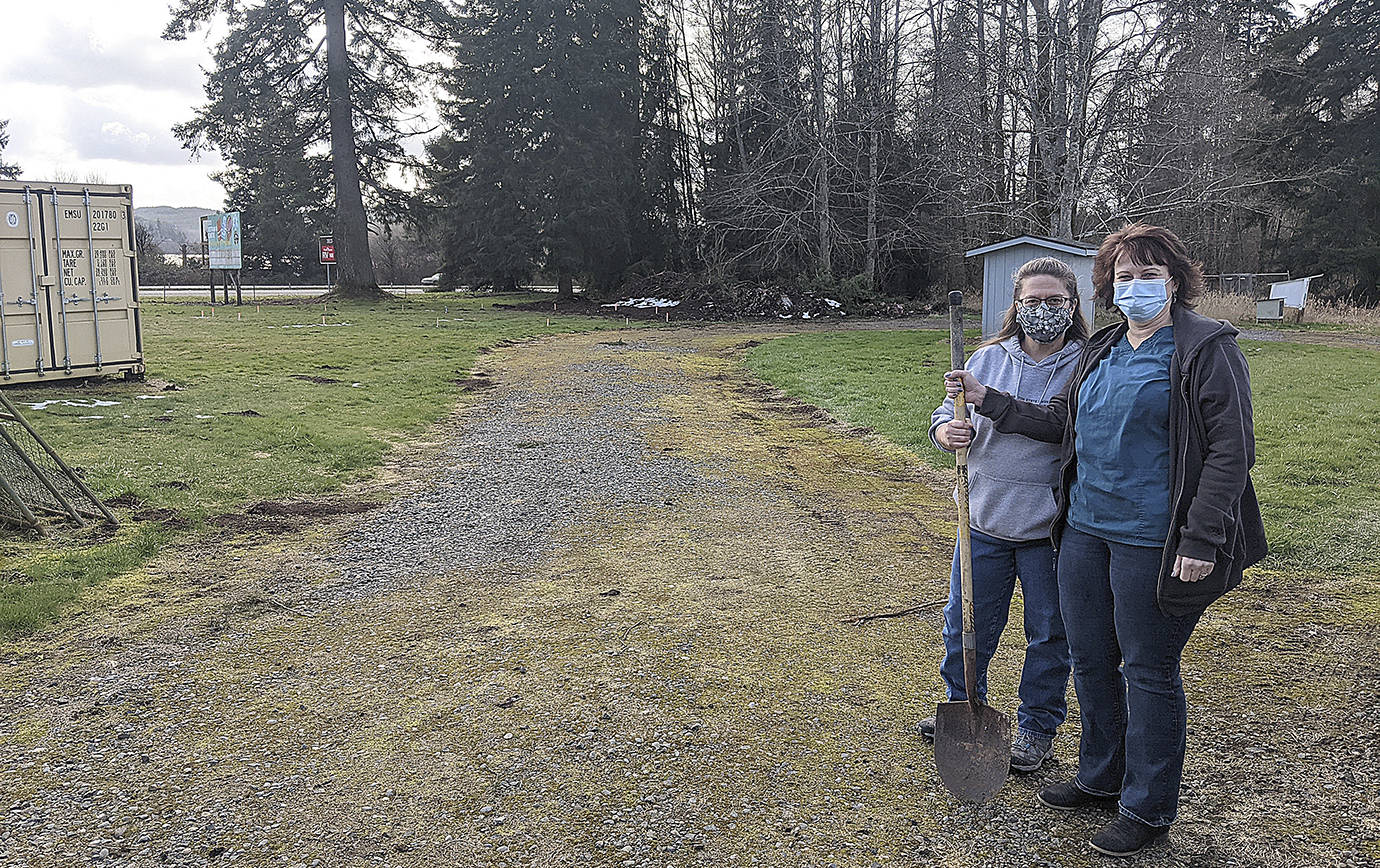By Dave Haviland
For The Daily World
A new resource for injured birds in Western Washington could be taking flight just outside of Montesano later this year.
A two-story, round cedar building alongside Highway 12 will offer rehabilitation to recovering raptors. Drs. Sonnya Wilkins and Corrie Hines are veterinarians and licensed wildlife rehabillitators who founded the non-profit Twin Harbors Wildlife Center in 2018. The center has seen plenty of raptors injured by vehicles or other types of mid-air collisions since then, but their current licensing restrictions only allow them to house the birds during non-flight recovery, Wilkins said. The birds then need to be transported to areas where they can be prey-tested or flight-tested in a flight conditioning enclosure before they are released.
Flight-testing ensures that the recovered birds are able to escape injury once they are released. Prey-testing involves making sure the birds can hunt for their own food after eating all of that “hospital food.” The nearest areas for this kind of testing right now are Bainbridge Island and Lynnwood. Wilkins says once they test well they try to release the birds as close to where they were found as possible, this new pen would make that more likely as well.
Last week, a circle of wooden stakes outlined the future home of the new flight cage on Old Beacon Road next to Grays Harbor Veterinary Services where Wilkins practices. Hines volunteers her time when she’s not working out of Mountainview Veterinary Hospital in Olympia. Wilkins explained the 60-foot diameter cedar building will be lined with vertical cedar planks with a netted ceiling to let the weather in. They’re hoping to be able to offer the new site in the next three to six months, depending on construction, saying confidently that it will be by the end of the year.
The expansion is funded in part by a grant from the state Department of Fish and Wildlife, but the non-profit group is also seeking other funding and donations. Wilkins said they were awarded a $30,000 grant already and have applied for a second grant to help cover the expected $80,000 cost.
Many bird species are considered raptors, most commonly eagles, hawks, falcons, owls, and even vultures. Most of the injured raptors seen in Western Washington are bald and golden eagles, and various species of hawks and owls. Wilkins said most of the injuries she sees are the result of man-made structures and activities such as collisions with cars, power lines, windows, and fences, along with pesticides, poisons, and injuries from storms.
The center currently sees about 250 injured animals a year, not just birds. Wilkins says they get everything from squirrels to sea birds, tiny bear cubs, and the raptors. “Our plan is to go to 2,000 animals a year, because that is the number of animals that Olympic Wildlife Center was doing in McCleary before they shut down.” Wilkins adds, “but we had to start somewhere.” While it has been several years since the McCleary sanctuary was available, Wilkins says local rescuers still feel the need when a recovering raptor needs to be sent out of the area.
The birds heal fast, “their metabolism is so different than ours, they’ll heal from a fracture in at least two weeks,” adds Wilkins. Most birds spend three to four months at the center, if they are a migratory bird they may stay through their off-season. The new pen will only be for flight, and the birds will not cohabitate.
“What it’s going to do is allow us to have long-term capacity,” said Wilkins. “Every day that they are in rehabilitation is more stress to them because they’re wild animals.” She said that one of the most stressful parts of any bird’s recovery is transporting them, and this new pen will allow them to skip that step before they are able to be released. “They’re terrified of people. They’re terrified of being in a cage. And so the stress just compounds every day that they’re in rescue.”
The Department of Fish and Wildlife notes on it website that most wild animals do not need to be rescued, stating that, “Every year, hundreds of young wild animals such as fawns, baby seals, and baby birds are needlessly ‘rescued’ and referred to wildlife rehabilitators.” Those finding injured animals in Clallam, Grays Harbor, Jefferson, Kitsap, Mason, Pacific, Pierce, and Thurston counties can call the region 6 offices in Montesano at 360-249-4628, or email TeamMontesano@dfw.wa.gov.
The Twin Harbors Wildlife Center has also been trying to recruit volunteers but an orientation to train them hasn’t been possible in a socially responsible manner under current COVID-19 restrictions. They offer multiple ways to donate and get involved. Find details at https://twinharborswildlife.weebly.com/ or on their Facebook page https://www.facebook.com/Twin-Harbors-Wildlife-Center-276452699960410/.


